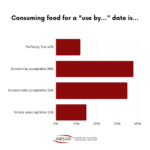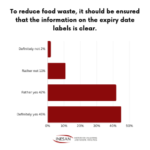
Attitudes towards ‘use by’ dates
19. 11. 2023
Etikety s datem spotřeby – priorita politiky
26. 11. 2023Our survey reveals that 38% of respondents consider it “occasionally acceptable” to consume food past its “use by” date. This significant percentage reflects a flexible yet cautious approach to consumer behavior, possibly influenced by a growing awareness of food waste issues. While it is important to follow food safety guidelines, this flexibility suggests that many are willing to rely on their own judgment about food quality and safety beyond the printed date.
This attitude opens up important discussions about the need for more nuanced public education about food safety and quality. Consumers should be empowered with the knowledge to make informed choices. Engaging consumers in this dialog is critical. By understanding their perspectives and behaviors, policymakers, food industry leaders and environmental advocates can better tailor strategies to reduce food waste. This includes not only technological innovations and policy changes, but also targeted educational campaigns that help bridge the gap between food safety concerns and the desire to reduce waste.
As we continue to combat food waste, recognizing and responding to these consumer insights is critical. It is a delicate balance between ensuring safety, reducing waste and respecting consumer autonomy.
➡️ For more information about this issue see
and





